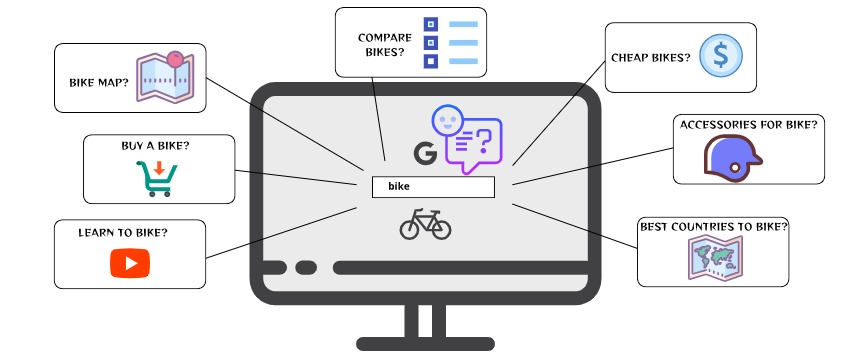The primary purpose of a search in a search engine is to get information. Users frequently seek a certain kind of solution, knowledge, or resource while conducting a search.
- What search intent are users looking for?
- How do I address this search query? What search intentions should be included in my content strategy to reach the right audience and increase conversion rates?
- Who is your target market at different stages of the purchase cycle?
- What type of content meets their needs best, according to search intention (informational, commercial, or transactional)?
Are you offering all types of user requests on your website? Are they happy with the search results you provide them? If yours doesn’t satisfy their needs entirely, they may simply bounce back to another site. It’s time for a transformation that will please Google as well as visitors!
Google’s algorithms over the years
In order to give the greatest relevant answers at the top of the results, search engines create algorithms to try and figure out which purpose is behind searches and keywords in order to serve up the most suitable responses.
Google, therefore, seeks to:
- Understanding the researcher’s question with an algorithm.
- Analyze all available answers.
- Rank the responses in order of relevance.
- Google will produce results based on its historical data and ranking signals that best match the most common intent.
Previously, search engines such as Google tried to get the most relevant results for a search by matching keywords. Now, search engines need to understand what is the intent of users.
Google has been focusing on the user experience for a long time with upgrades, algorithms, and ranking systems. The Hummingbird and BERT algorithms are intended to better understand Internet users’ needs and intent.
In addition to the improved algorithms, the SERP was modified to improve the appearance of search engine results.
What are the types of queries you can classify with the search intent?
The intention of the users can be analyzed by the query they are typing on the search engine. We can are generally classified them into four major groups.
Informative
Internet users are looking for information on a specific subject. These are the most common types of searches and generally have the highest search volumes.
They look for content-rich pages that provide them with answers to their questions.
[how to choose a good tv]
[what is an HD tv]
Navigational
Requests with a navigational search or brand query intent already know which company or brand they’re looking for, but they need help getting to a specific product or service page.
They want to get information about the products or services for a specific website.
[HD TV samsung]
[offer Black Friday tv walmart]
Commercial investigation
Internet users have the intention to buy in the (near) future and use the web to do their research. These people need some more time and convincing before buying.
They want to buy, but they need more to guide them to the right product or brand.
[best TV HD]
[where to buy a TV HD]
Transactional
Transactional queries are the most commercial with the highest chances of converting. The Internet user browses the web to find the best purchase. People are searching with a transactional intent when their purpose is to buy something.
Transactional results pages are generally 100% commercial pages (products, services, and subscription pages).
[buy tv HD amazon]
[TV HDTV 1080p Samsung]
Why is internet user intent important in SEO?
If you want to be successful in SEO and content marketing today, it needs to be an integral part of the SEO strategy.
- By creating the appropriate content, you meet our user needs. Matching it to intent helps rank at the top of Google’s results for targeted audiences.
- By providing relevant content, you position yourself as an authority. Visitors will remember your brand and be more likely to click on results again after a positive first experience.
- By creating varied content on the same subject, you can capture traffic at different stages of the purchase cycle and increase conversion.
- By providing information at different stages of the user’s purchase cycle you support the users through the whole process with initial research, the sale, and even after its purchase.
How to include search intent in an SEO strategy?
Search intent, also known as a user request, can be defined as the reason that prompted a user to search online.
Get natural referencing for all stages of the purchasing cycle
- Split content by search intention
- Optimizing content to match the right intention
- Determine the essential keyword strategy for SEO
- Focus on the user
Providing content that exactly matches search attention will increase click-through chances and reader satisfaction.
How to apply it when writing new content?
The creation of relevant content, which exactly meets users’ expectations, on as many interesting requests as possible to capture a qualitative audience, must be your priority.
Create lists of keywords and classify them by search intent
To determine the usefulness of each keyword, you need to do keyword research by search volume, classify expressions by categories and assign an intention to each expression.
Observe Google Results
Observe the similarities of the best results: Type of content (blog post, product page, video…), Content format (guide, reviews, comments, listing), and Angle of treatment of the subject.
Modify or create adapted publications
Ask yourself these questions and do this study before creating or adapting any content:
- What is the purpose of this research for users?
- What is the intention that Google identified in its results?
- What type of content is most suited to the trend?
- How do I stand out from my competitors?
Search intent is a component of content marketing and SEO that must be integrated into the strategy if you want to be successful in these areas today. To improve conversion rates and provide positive user experiences, you must pay particular attention to search intent in your marketing campaigns. Start now creating relevant content, which matches user expectations.


Great content! Keep up the good work!
Congratulations I don’t need to tell you how important it is to optimize every step in your SEO pipeline. But unfortunately, it’s nearly impossible to cut out time or money when it comes to getting good content.At least that’s what I thought until I came across Article Forge…Built by a team of AI researchers from MIT, Carnegie Mellon, Harvard, Article Forge is an artificial intelligence (AI) powered content writer that uses deep learning models to write entire articles about any topic in less than 60 seconds. Their team trained AI models on millions of articles to teach Article Forge how to draw connections between topics so that each article it writes is relevant, interesting and useful.All their hard work means you just enter a few keywords and Article Forge will write a complete article from scratch making sure every thought flows naturally into the next, resulting in readable, high quality, and unique content. Put simply, this is a secret weapon for anyone who needs content.I get how impossible that sounds so you need to see how Article Forge writes a complete article in less than 60 seconds!
I was excited to discover this website. I want to to thank you for your time for this wonderful read!! I definitely liked every part of it and i also have you book-marked to look at new things on your website.
Where there is a will, there is a way.